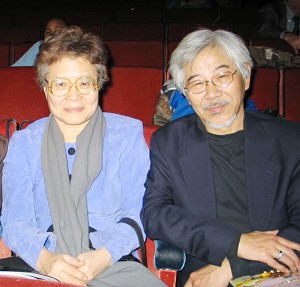(Clearwisdom.net) Divine Performing Arts' Chinese New Year Splendor opened at Radio City Music Hall in New York City on January 30, 2008. Huang Zaitian, director of the Taiwan Research Institute, and his wife Yang Shuqing were among the attendees.
Huang Zaitian, director of the Taiwan Research Institute, and his wife Yang Shuqing watched the opening show at Radio City Music Hall
Huang said the entire program was both very graceful and spirited, including the classical dances. His favorites were "Drummers of the Tang Court" and "Victory Drums," which deeply impressed him with their grandeur and magnificence. His wife Yang Shuqing said the performance is " high-level" and an "eye-opening experience," and that the stage setup and backdrops were exquisite, with attention to detail. She said the entire show was different from ordinary entertainment because its themes are educational. The couple asked to be informed about next year's performance.
Huang also remembers "The Power of Awareness", saying, "I was truly touched to see the passersby [in the park] stepping forward to help them [persecuted Falun Gong practitioners]. "Falun Gong practitioners are not only compassionate and tolerant, but also very talented. I really admire them."
Huang and his wife came to the U.S. as students in 1972. Huang Zaitian used to be the deputy director of the Taiwan Center, and Yang Shuqing was once the secretary-general of the Democratic Progressive Party. Certain Chinese media have called them "Taiwan independence advocates." During a recent campaign known as "Sewing Taiwan with Love" in support of Taiwan's application for UN membership, Huang and his wife did not speak much in front of the media and devoted themselves to their endeavors instead.
Huang said, "We do not like the Communist Party's hypocritical, totalitarian rule and its threats against the Taiwanese people. We hope the Mainland Chinese can realize democracy and freedom in the near future." The couple said they cherish Taiwan's hard-won democracy and would quietly safeguard traditional Taiwanese values that are inclusive of different ethnic groups, as they have done in the past.






